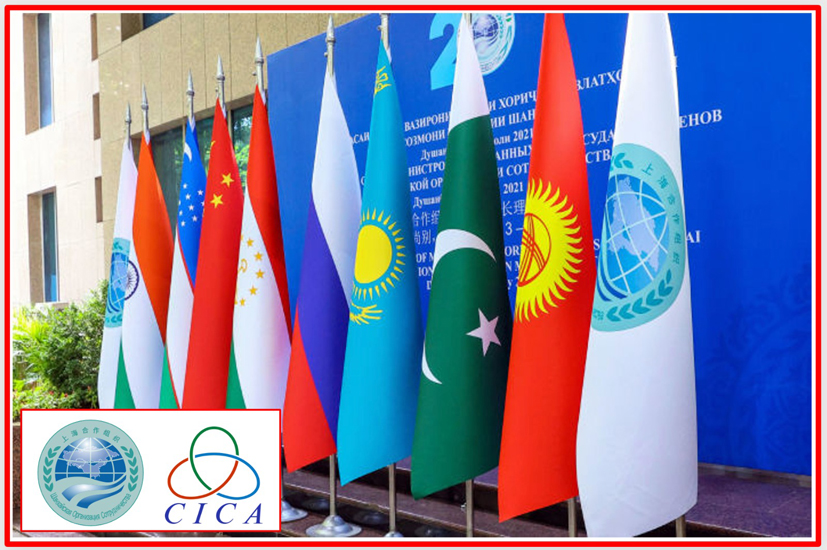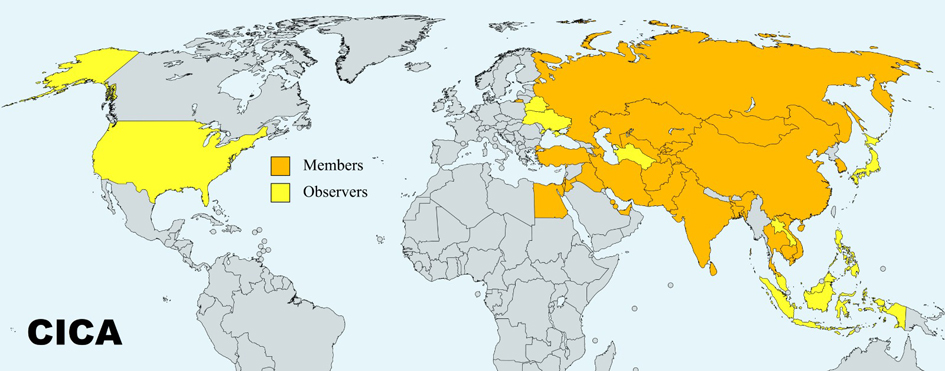ELEVATE & ENNISMORE PARTNER TO BRING $500 MILLION MONDRIAN BEACHFRONT RESIDENCE TO AL MARJAN ISLAND
During 2024… Kazakhstan’s challenges and Roles in Chairmanship of SCO and CICA

Astana – Kazakhstan has become an influential player in global diplomacy and the geopolitical landscape due to its prominent role as the chair of the Conference on Interaction and Confidence-Building Measures in Asia (CICA) and Shanghai Regional Cooperation Organization (SCO).
In recent years, Kazakhstan has been able to achieve local, regional and international strategic achievements, but this year 2024 has a special character and unique importance for Kazakhstan, as its political and external successes have been able to reap what countries with an ancient history in international relations have not achieved, and this is represented by its presidency.
The Republic of Kazakhstan faces during the year 2024 great challenges locally and regionally, while it is making exceptional and distinguished efforts in order to make its tireless efforts successful and achieve pioneering results.
Navigating the complexities of the global multilateral setting, Kazakhstan’s diplomatic finesse, strategic vision, and proactive engagement have shaped the trajectory of CICA and positioned the nation as a key player in the broader landscape of international relations.
The recent convening of the CICA Senior Officials Committee SOC in Astana provided a comprehensive review of CICA’s achievements in 2023, offering valuable insights into the efficacy of Kazakhstan’s diplomatic leadership. It also shows Kazakhstan’s multifaceted contributions, ranging from economic prowess to diplomatic leadership, underscore its pivotal position in shaping regional dynamics and influencing the broader landscape of global cooperation and understanding.

With Kazakhstan’s strategic prowess, it has become an important architect of stability in the heart of Eurasia, which may highlight the importance of Kazakhstan’s emerging leadership role regionally and internationally, as Kazakhstan’s rise to prominence at the CICA and SCO highlights the country’s determination to determine its own destiny.
Kazakhstan is leaving its mark on the work of the SCO, a strong alliance that prioritizes economic cooperation and security. As the leading figure of the SCO, it seeks to strengthen the position of this platform as a stabilizing force in a constantly changing geopolitical environment.
Kazakhstan has succeeded in achieving the goals of the SCO by assuming its leadership four times since its founding in 2001. It is making concerted efforts to transform the SCO into a practical and productive forum that encourages greater trade and security cooperation, while at the same time committing to addressing environmental issues and building relations Closer in the digital realm.
Kazakhstan, as Chair of the Organization, highlights its commitment to updating the Cooperation Program for 2025-2027 in the fight against terrorism, separatism and extremism.
Kazakhstan adheres to the “extended neighbourhood” theory in its foreign policy, which sees Kazakhstan’s prosperity linked to the prosperity of its region and neighbouring countries.
The membership of the SCO, a permanent intergovernmental organization founded in June 2001 in Shanghai, includes: China, Kazakhstan, Kyrgyzstan, Russia, Tajikistan, and Uzbekistan. In 2017, India and Pakistan became full members, and in 2021, the leaders of the organization approved Iran’s request to join. To the organization.
During the SCO summit in Samarkand, Uzbekistan, last year, member states agreed to begin Belarus’ accession to the Shanghai Cooperation Organization. The organization welcomed the membership of the Kingdom of Saudi Arabia as a dialogue partner with Qatar and Egypt, which signed their memorandums in Samarkand.
Regarding Kazakhstan’s efforts and leadership role during its presidency this year of the Conference on Interaction and Confidence Building Measures in Asia (CICA), Kazakhstan’s journey began from laying the foundation stone for CICA until it assumed its presidential role again in 2020 over the course of 30 years of its existence and under its leadership.
Kazakhstan’s leadership at the CICA conference was distinguished by wise initiatives, transformative proposals, and commitment to strengthening dialogue and cooperation.
By endorsing the idea of “Partnership for Security and Development in Asia”, Kazakhstan assumes a global leadership position, having put in a great deal of work to organize the Financial Summit, establish the CICA Council on Sustainable Communication (CSC), and plan the CICA Higher Summit. And chairing the conference on environmental issues (HLCE), which will be held next July in Astana. These initiatives also include support for volunteer movements in the CICA region and the establishment of the Partnership Network of Leading Universities in CICA Member States (PNLU).
Kazakhstan has become an influential player in global diplomacy and the geopolitical landscape due to its prominent role as CICA Chair. Its diplomatic prowess, strategic vision and proactive engagement have shaped the course of CICA and positioned the nation as a key player in the broader landscape of international relations.
Kazakhstan’s many contributions, from economic prowess to diplomatic leadership, underscore its effective and influential position in shaping regional dynamics and influencing the broader landscape of global cooperation and understanding.
The presidency of the CICA Conference is a testament to Kazakhstan’s wise leadership and its commitment to strengthening regional cooperation. The CICA Conference, which was launched by the first President of Kazakhstan, Nursultan Nazarbayev, in 1992, has emerged as a platform for dialogue and cooperation among Asian countries, and it is striking. Rooted in inclusivity, consensus-based decision-making, and confidence-building measures.
The CICA conference aims to address common challenges and promote peace, security and stability across the diverse Asian continent. With 28 member states in the organization, Kazakhstan’s role as the driving force behind the establishment of the Conference on Interaction and Confidence Building Measures in Asia reflects the nation’s dedication to building bridges. and promoting understanding in a region characterized by diverse cultures, political systems and economic structures.
Since its establishment, Kazakhstan has transformed CICA into a dynamic and influential multilateral forum. Kazakhstan’s presidency of CICA from 2002 to 2004 marked a significant period of growth, as the country actively worked to enhance the organization’s vision and effectiveness.
The Kazakh leadership’s focus on practical, results-oriented diplomacy during this period contributed to the development of the Almaty Code. This landmark document articulated the basic principles and objectives of the CICA Conference.
Kazakhstan’s continued commitment to the Conference on Interaction and Confidence-Building Measures in Asia (CICA) is evident in its most recent presidency from 2022 to 2024, as the country continues to support initiatives aimed at strengthening regional connectivity and cooperation in combating terrorism and sustainable development within the framework of the Conference on Interaction and Confidence-Building Measures in Asia.
Kazakhstan’s journey within CICA is unfolding as a story of visionary leadership and steadfast commitment to strengthening cooperative dialogue, with the sixth CICA summit in Astana in 2022 representing a watershed moment, as Kazakhstan, under the leadership of President Kassym-Jomart Tokayev, proposed the Astana Statement, which calls for This proposal, which received unanimous approval, signalled a paradigm shift in the scope and influence of the organization. Kazakhstan’s subsequent presidency from 2022 to 2024 strengthened its role as a proactive architect of change within the CICA conference.
Priorities identified during this period ranged from establishing the CICA Council on Sustainable Communication to transforming the CICA Finance Summit. The state’s role in co-sponsoring key planning documents during the recent SOC meeting in Astana underscores its nuanced approach in steering the course of the CICA conference in 2024 and beyond, paving the way for a promising future of diplomatic cooperation and influence.
Under the leadership of President Tokayev, Kazakhstan has outlined a comprehensive roadmap for the transformation process, paving the way for a new era in the development of CICA. The strategic priorities included a variety of initiatives, from establishing the CICA Council on Sustainable Communication to transforming the CICA Finance Summit into a permanent platform.
Initiatives to promote economic recovery, regional financial cooperation, and counter-terrorism efforts reflect Kazakhstan’s commitment to addressing multifaceted challenges.
One of the important aspects of Kazakhstan’s influence within the CICA conference is its economic strength, driven by diversification efforts and focusing on vital sectors such as oil, gas, mining, agriculture, manufacturing, and services, as its position as the largest uranium producer in the world and its large reserves of oil and natural gas have contributed to the country’s economic growth. It positioned it as a key player in shaping regional dynamics through economic diplomacy.
The latest CICA Senior Officers Committee (SOC) meeting, in Astana in December 2023, demonstrated Kazakhstan’s influence on the organization and highlighted the approval of key planning documents for 2024, including the CBM Implementation Plan and the budget for the CBM Secretariat. In Asia, highlighting Kazakhstan’s careful approach to shaping the forum’s annual agenda.

















